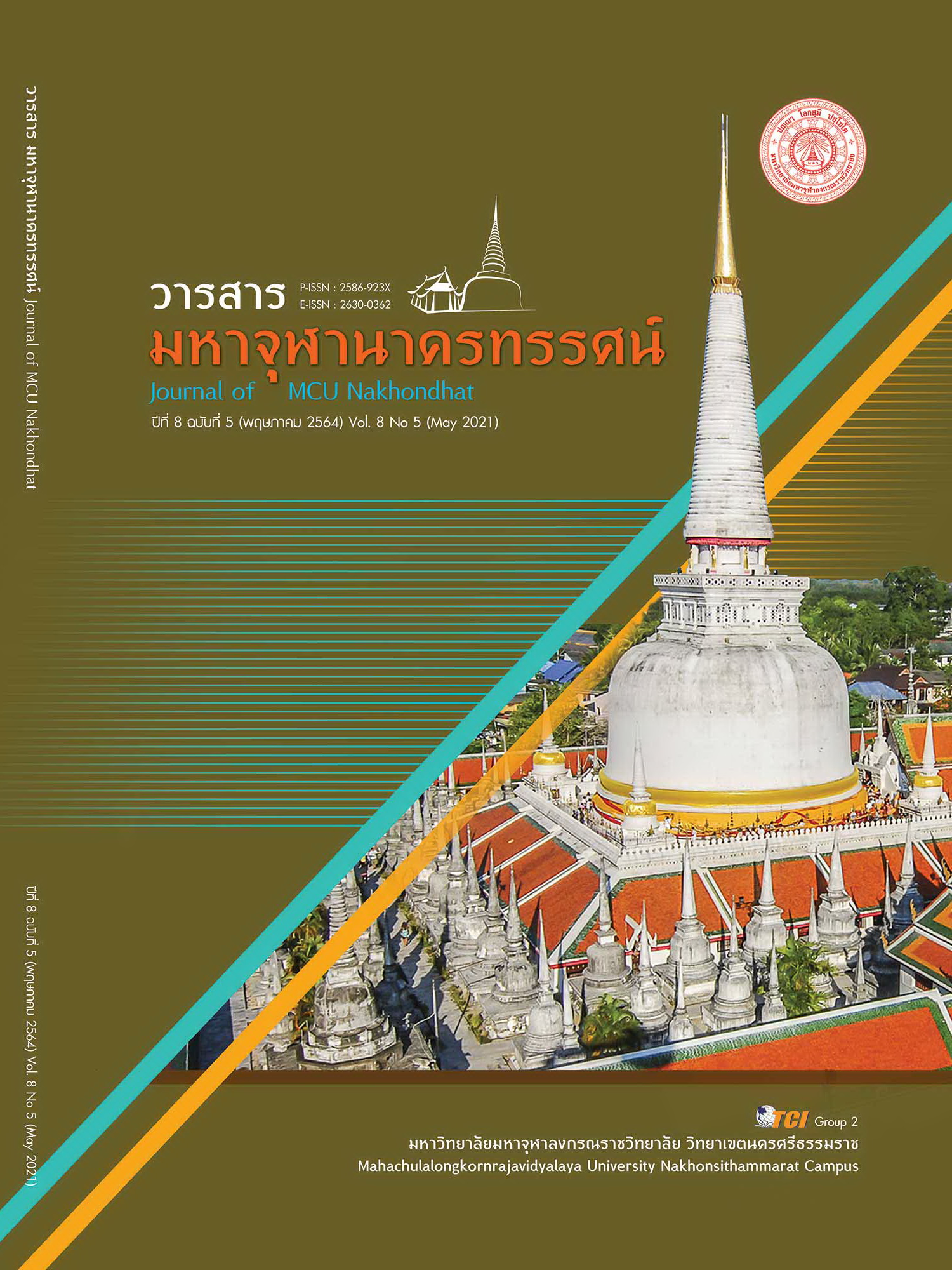LEADING MODERN LIFE TO THE SUCCESS OF WORK BY USING THE PRINCIPLE OF ITT BAHT 4
Main Article Content
Abstract
Modern life in the way of success in work By the nature of that person Want to be successful in today's society Which has, yes, happened for just one day But everyone wants to be happy and feel that they are successful in everyday life and in all areas of their life as well. Whether it's family, work, finance, or business, many people are as successful as they hoped. And at the same time, there are still many people on the path to success in each area they want. It is good to learn how to live together with acquiring knowledge to apply in modern life. Therefore, to apply the principles to live a stable life in each area that you want. The principles in Buddhism should be used to benefit. The principle of the power of Itt Baht 4 Apply to achieve success in work or life, such as the use of Itt Baht 4 as a way of working. To be successful that the Lord Buddha has listened carefully Which consists of 4 guidelines Ie chạntha, or satisfaction, that is, satisfied with the work. Wiriya or persistence is to diligently work on it with effort. Chit ta is to focus on what works and do it with determination. Vimongsa is thoughtfulness in work, perseverance in wisdom, contemplation Look for the reasons and examine the slack in what you did. Itt Baht 4 It will enable us to be successful in life and work as expected.
Article Details
References
นครเยอร์. (2564). ศาสนากับการดำเนินชีวิต. เรียกใช้เมื่อ 22 กุมภาพันธ์ 2564 จาก http://tripopyun.blogspot.com/2013/09/2.html
ประสงค์ สุ่นศิริ. (2562). ค่านิยมที่เปลี่ยนไปในสังคมไทย. เรียกใช้เมื่อ 16 มกราคม 2564 จาก https://www.naewna.com/politic/columnist/42108
ปราณี รามสูตร และจำรัส ด้วงสุวรรณ. (2545). พฤติกรรมมนุษย์กับการพัฒนาตน. กรุงเทพมหานคร: สถาบันราชภัฏธนบุรี.
พระธรรมปิฎก (ป.อ. ปยุตฺโต). (2546). พจนานุกรมพุทธศาสตร์ ฉบับประมวลธรรม. (พิมพ์ครั้งที่ 12). กรุงเทพมหานคร: มหาวิทยาลัยมหาจุฬาลงกรณราชวิทยาลัย.
. (2564). พุทธธรรม (พิมพ์ครั้งที่ 10). กรุงเทพมหานคร: บริษัทสหธรรมมิก จำกัด.
พัชรินทร์ สิรสุนทร. (2556). แนวคิด ทฤษฎี เทคนิคและการประยุกต์เพื่อการพัฒนาสังคม (พิมพ์ครั้งที่ 1). กรุงเทพมหานคร: จุฬาลงกรณ์มหาวิทยาลัย.
เมธีธรรมาภรณ์, (ประยูร ธมฺมจิตฺโต). (2535). พุทธศาสนากับปรัชญา (พิมพ์ครั้งที่ 2). กรุงเทพมหานคร: โรงพิมพ์มหาจุฬาลงกรณ์ราชวิทยาลัย.
วิกิพีเดีย สารานุกรมเสรี. (2562). อิทธิบาท 4. เรียกใช้เมื่อ 16 กุมภาพันธ์ 2564 จาก https://th.wikipedia.org/wiki/อิทธิบาท_4
สุภาวดี บริกุล. (2553). ความสัมพันธ์ระหว่างการปฏิบัติงานตามหลักอิทธิบาท 4 กับประสิทธิภาพการทำงาน. ใน วิทยานิพนธ์พุทธศาสตรมหาบัณฑิต สาขาวิชารัฐประศาสนศาสตร์. มหาวิทยาลัยมหาจุฬาลงกรณราชวิทยาลัย.
เสกสันต์ บุญยะ. (2559). การใช้หลักอิทธิบาท 4 ในการบริหารบุคคลของผู้บริหาร โรงเรียนพระปริยัติธรรมขนาดเล็กแผนกสามัญศึกษา สังกัดสำนักงานเขตพื้นที่การศึกษาเชียงใหม่ เขต 4. ใน วิทยานิพนธ์ครุศาสตรมหาบัณฑิต สาขาวิชาการบริหารจัดการการศึกษา. มหาวิทยาลัยราชภัฎเชียงใหม่.
Chapman, E. N. (1995). Supervisor Suviva Kit (2nd ed.). California: Science Research Associates Inc.
Lahey, B. B. (2001). Psychology: an Introduction. (7th Edition). New York: McGraw – Hill Company, Inc.


